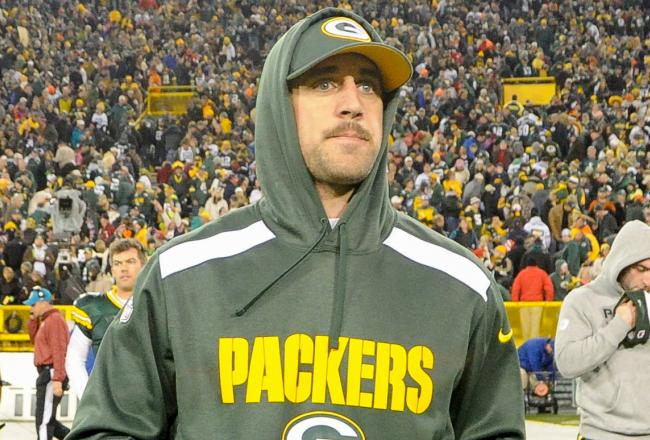Roger Goodell’s numerous attempts to adhere to stricter safety guidelines has come with a bit of laughter in the last two years. No one really knows what Goodell’s intentions are, but the understanding of injury concern is very real across the league.
Solving the injury problem has led to rule changes that many do not like. People will complain that the product is being diluted (just ask Ahmad Brooks), but that doesn’t matter here. The league concern over concussion and brain related trauma as a predecessor to costly lawsuits is rather obvious. But if you think the league really cares all that much about Tyrann Mathieu’s recent ACL injury, you’re missing the big picture.
While limiting Brooks’ ability to hit the quarterback in a “violent” manner can be perceived as an injury concern, it has more to do with the NFL’s desire to protect the most important characters in its ongoing plot: the quarterbacks.
A whopping 16 of the 32 teams in the league have dealt with what I would call “extensive” injury issues at the quarterback position since the beginning of 2012. I would define extensive as anything causing that player to miss more than a month at a time and would also include quarterbacks who sustained lingering injuries that seemingly came and went, and often derailed their season.
Well over half the teams in the current league depend upon the passing game to generate the majority of their offense. Moreover, the “comeback” nature of many regular season games which go down to the wire is contingent upon each team having a player under center who can navigate a late game rally. Keeping the quarterback healthy is essential to both individual team success as well as the fortunes of the league in total.
The league and its rules has created a forum in which the quality of games often hinges upon quarterback play to an absurd level. That stinker of a game last week in Arizona was made quite possible by the fact that the Rams were going with a backup ill-equipped to do battle with a defense as stout as the Cardinals. Many expected the Cards to win, but to do so by the score of 30-10 in a game that was really never close only enhances the reality in play here.
Speaking of Clemens, he is one piece to a laundry list of individuals worth mentioning here. Take a look at the following list of names: Derek Anderson, Kellen Clemens, Kyle Orton, Tarvaris Jackson, Matt Moore, Josh McCown, Ryan Fitzpatrick, Matt Cassel, Matt Flynn and Jason Campbell. Each was blessed with opportunities to start throughout their career. They all have also found a nice niche in a second string role since that time and illustrate the importance of the position for league execs in every city.
At minimum, each player on that list had five full seasons accrued in the league prior to 2013. Only one player on the list entered the league with any sort of anticipated success level, that being Jason Campbell.
Josh McCown is one very interesting case given what he has done this season. A third round pick during the 2002 NFL Draft, he has a career passer rating of 75.8 and a TD-INT split of 46-45. Yet, he is playing in the fourth season during which he has attempted 150+ NFL passes. He has been displaced from the league on three different occasions only to come back each time with a seemingly shocking level of success when provided an opportunity.
His 2013 performance with the Bears might not get them to the playoffs, but it could be good enough to ensure he is employed well into his late 30’s. Having a player who can step in for an injured Q.B. and navigate an offense with reasonable fluidity is a trait not only desired by each and every organization, but also possessed by few people within society if you look at it as a true job.
You see, the lifecycle of the prototypical NFL quarterback looks absolutely nothing like that of Tom Brady or Ryan Leaf. Analysts and media outlets will always talk about the rare story-lines that attract attention, but the workmanlike performance over time, as mediocre as it may be in total, also deserves some attention. It may bore some, but having adequacy at the position along with depth given the rate Q.B.’s seem to be going down is a discussion that is paramount in every general management meeting room.
Take a look at the NFL’s supposedly worst team prior to the last month or so: Jacksonville. The Jaguars turned to Chad Henne early on in the season, just as the Dolphins had at one point in time a few years back.
Henne is a very unique case as well. He was a second round pick out of Michigan and, during high school, was one of the more ballyhooed Q.B. prospects the great state of Pennsylvania had ever seen. He spent four seasons with Miami prior to joining the Jaguars prior to 2012. His 2009 and 2010 performances served as the only evidence as to what he is capable of in this league prior to 2013, and the picture isn’t all that great.
But is Henne really as laughable as many casual fans may assume him to be? The Miami teams he played on were very weak at the skill positions thanks in large part to an incredible inept management group that has done little since the days of Dan Marino.
His receivers in Jacksonville have done little to help this year, but Henne has navigated them to a 4-9 record and should be given a certain amount of credit for helping avoid a potentially awful season. Had the Jags sunk to 1-15 or something truly atrocious, it could have ruined his career. Instead, Henne proved once again that he is a veteran and a pro at his craft. His performance in the face of adversity could easily extend his playing career another 4-5 years depending on circumstances.
And that really brings the conversation full circle. Added injuries mean more opportunities for the Chad Hennes of the world. Roger Goodell and the fans he cares for so dearly might not be ecstatic over that, but I bet Henne’s family and agent are.
Teams are salivating trying to find a young player who can come in and “save” the franchise. While finding that person is undoubtedly important, it doesn’t remove the need for a multitude of players who can man the position to some extent.
The NFL is desperate important skill position pieces, and that simply isn’t going to change. The physical nature of the game has it looking like a war of attrition on most fronts, and so clubs should and will be ready to stock up wherever they can find the ammunition.
Josh McCown is probably not going to be signed by a proven playoff team with Super Bowl aspirations, but he will get a chance somewhere. He will likely bounce to a semi-mediocre team with the possibility of starting or competing for the job, and his career will linger on thanks to a few quality performances. Such is life for perhaps America’s most unique profession.







